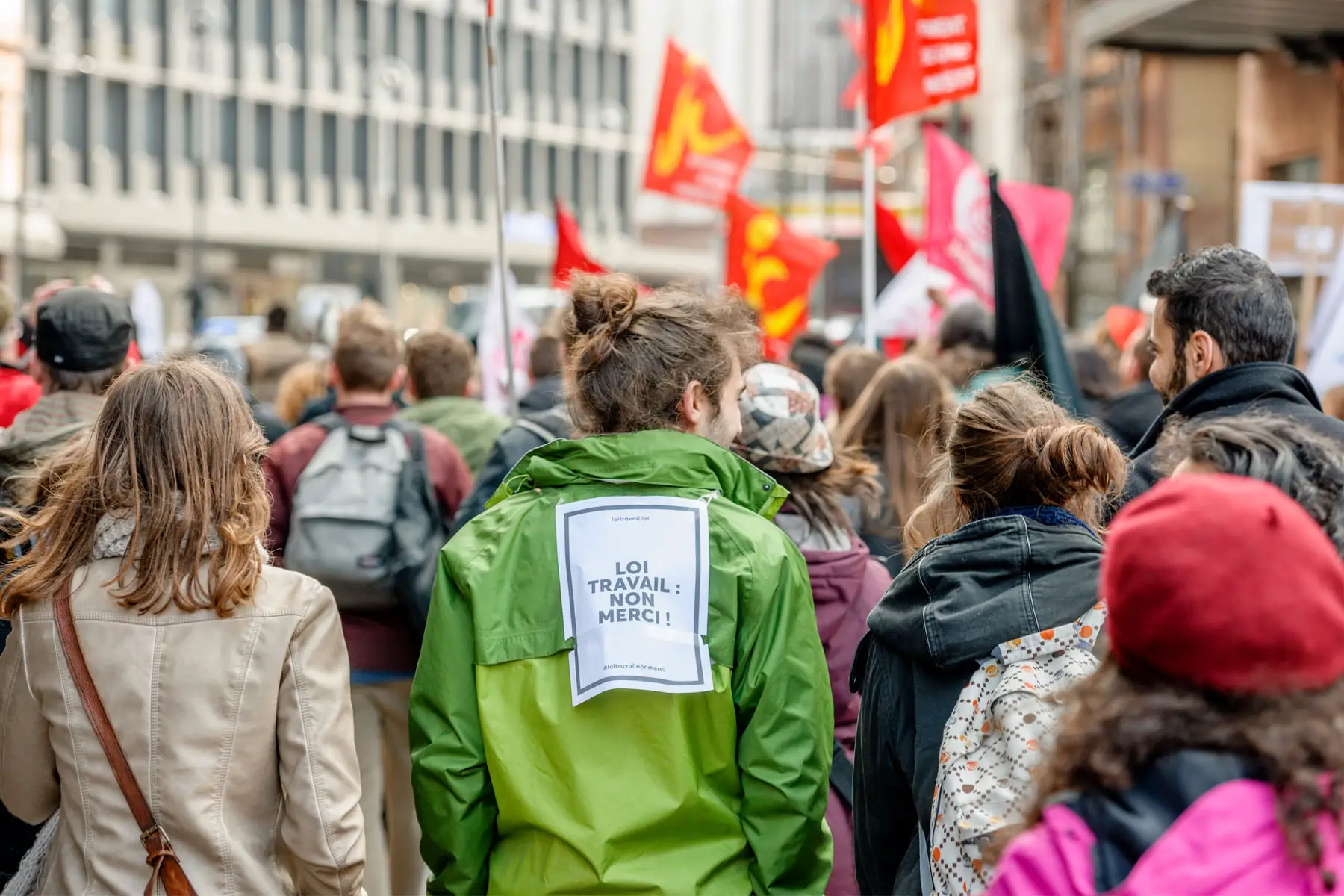From navigating employment contracts to parental leave, unions, and retirement, French labor laws offer strong and long-standing protection for workers. Indeed, in France, you get a 35-hour workweek and higher-than-average minimum wage. However, it’s important to understand your rights and responsibilities. In this introduction to labor law in France we will review everything from discrimination and dismissals to training and development.
We’ll cover the following topics:
- Introduction to French labor law
- Foreign workers – your right to work in France
- Employment contracts in France
- Wages and salary in France
- Working hours in France
- Paid and unpaid leave in France
- Parental rights in France
- Social security and tax in France
- Protection from discrimination at work in France
- Joining a union in France
- Health and safety at work in France
- Training and development in France
- Terminating the employment relationship in France
- Company mergers and insolvencies in France
- Temporary, part-time, agency, and informal workers in France
- Making a complaint as a worker in France
- Useful resources
Regus Global
Looking for a great location to work on your business? Regus is a global network of workspaces. Providing private office space, co-working places, virtual offices, and meeting rooms, their professional workspaces allow you to get business done in a productive environment. Join the Regus global community and find the perfect place to work.
Introduction to French labor law
The French Labor Code details the rights and responsibilities of individuals, trade unions, and companies. As a whole, employee protections in France are robust. For example, it’s harder for employers to terminate employees in France than in many other countries. In 2017, France also implemented a right-to-disconnect mandate, which legally entitles employees to not respond to business correspondence after working hours.

As with any other country, it’s important you read through any French employment contract before starting a job. This is the best place to see an overview of your particular conditions, and better prepare you for what you can expect from your new position. It’s important to also keep copies of any employment contract, along with any other documents you sign related to your work.
Foreign workers – your right to work in France
As is the case in most of the European Union, your right to work in France will largely depend on your citizenship. The two-tier system means you can work in France with minimal issues if you are an EU citizen. This is also true for citizens of European Economic Area/European Free Trade Area (EEA/EFTA) countries. However, you will need a work permit if you are not.
Following the UK’s departure from the EU in 2021, citizens of the UK also now need a work permit to legally work in France. It is worth noting that UK citizens who had been resident in France prior to 1 January 2021 did not lose their right to continue living and working in the country. However, any British nationals looking to work in France after 1 January 2021 have to apply for a work permit. Additionally, as of 1 October 2021, all British nationals who wish to live in France for longer than three months must have a residence permit.
If you are not an EU/EEA/EFTA citizen, then your best option is to find an employer who is willing to sponsor you. Your employer will then handle all the residence permit paperwork. Though there are other ways to gain a work permit, this is the most straightforward way.
Employment contracts in France
Do your research and know your rights, as employment contracts in France can be complicated. Be sure to get a written contract and review it carefully. Ask any questions you have before signing it. You have the right to have your employment contract translated into a language of your choice, but the French version remains the legally recognized contract in case of any disputes.
Keep in mind that if you aren’t a citizen of an EU/EEA country, you may only have access to certain kinds of employment contracts.
Fixed-term contract (contrat de travail à durée déterminée – CDD)
Fixed-term contracts have explicitly stated start and end dates. The maximum length is usually 18 months. This can extend to 24 months, under certain circumstances. Fixed-term contracts must be in writing. Keep in mind that neither party may end the contract prematurely unless there is a qualifying reason or both parties agree to do so.
Permanent employment contract (contrat de travail à durée indéterminée – CDI)
Permanent employment contracts are agreements to work for an indefinite period of time. They can be part-time or full-time and the conditions and working hours are usually specified in the contract. So, if you are an employee and want to quit, you need to give appropriate notice. The notice period will be stated in your contract. Similarly, an employer must respect termination protocols. In other words, they must demonstrate grounds for dismissal if they want to let you go.

Collective bargaining agreements
Many industries in France are part of collective bargaining agreements. Consequently, this could affect elements of your contract or your position. This could include trial periods or termination protocols. So, be sure to do your research and know your entitlements within your industry.
Trial period
Some employers will make use of a probationary period at the beginning of a contract. This gives both the employer and employee a chance to get a feel for fit. Employers can terminate employees within the trial period for any reason, without needing to follow normal termination protocols. Probation periods in indefinite contracts can range from two to four months. For fixed-term contracts, it will depend on the length of the contract. But it can be up to one month for contracts lasting six months or more.
Wages and salary in France
As of 1 January 2021, France has a comparatively high minimum wage, set at €10.25 per hour. This equates to €1,554.58 per month based on a 35-hour workweek. Keep in mind that this is the minimum salary for adults in formal positions. It’s likely that youths or apprentices could earn less. You will typically receive your salary monthly.
If you work overtime, French labor law stipulates that the initial eight additional hours will be paid at an additional 25% premium on top of your normal rate of pay. Overtime beyond those hours receives an additional 50% premium.
Working hours in France
French labor law dictates that the standard workweek in France is 35 hours per week. However, this can vary based on the industry and is subject to any collective bargaining agreements. Anything beyond this is considered overtime and should be compensated as such. While you’re on the job, you’re entitled to at least a 20-minute break for every six hours you work.

Of course, the specifics of your employment terms will all depend on your contract. This includes elements like flexible schedules, reduced hours, or sabbaticals. You should speak directly to someone at your organization to find out more.
Night work in France
In France, night work is defined as working between 21:00 and 06:00 and may not, in principle, exceed eight hours a day and 40 hours a week (44 hours if governed by decree or collective agreement). Employees also receive weekly rest days or extra pay for night work.
Pregnant women working nights must receive daytime work throughout their pregnancy and during the legal postnatal leave period if they so request.
Paid and unpaid leave in France
Annual leave in France
French labor law stipulates that full-time employees working a 35-hour week are entitled to a minimum of five weeks of paid leave annually. This is accrued at a rate of 2.5 days leave for every calendar month worked, up to a maximum of 30 days leave. Unless otherwise agreed with your employer, you cannot take more than 24 days’ annual leave consecutively. This equates to around four weeks. Your annual leave entitlement is arranged on a pro-rata basis, which may be something to consider if you work less than 35-hour weeks.
Unlike in other countries, annual leave entitlement in France is calculated from 1 June to 31 May. Typically, you are unable to roll over unused annual leave into the next year. French labor laws stipulate that employers must allow workers to take leave between 1 May and 31 October. In return, employees must take 12 consecutive days of annual leave during this period. Whether you’re allowed to take annual leave beyond these dates will depend on your employer. Be sure to check before making any travel plans or reservations if you are uncertain.
In addition, France has 11 national public holidays throughout the year, plus a further two celebrated only in the Alsace and Lorraine regions. Only 1 May (International Workers’ Day) is a mandatory holiday for all. However, if you do work this day, you’ll typically earn double pay for the day.
Maternity/paternity leave in France
Expectant mothers must take between eight and 16 weeks of maternity leave. If you’re expecting multiple children, or if you have a high-risk pregnancy, your maternity leave increases. If you’re pregnant and already have two dependent children at home, your maternity leave entitlement rises to 26 weeks. Should you be expecting twins your maternity leave rises to 34 weeks, and you get 46 weeks of leave if you are having triplets.
For expectant fathers, the good news is that paternity leave increased from 14 to 28 days in 2021. This rises to 32 days of leave if there are multiple births. Keep in mind that three days of your leave are covered by your employer, the rest are covered by social security.

As such, you will get the average of your salary for the three months before the birth, once on leave. This is capped at the quarterly social security ceiling.
Sick pay in France
If you become sick in France, your sick pay will come from the social security system, not your employer. You can claim sick pay from your fourth day of work absence provided you have a sick note from your doctor. You’ll then start receiving up to half of the daily wage that you have been receiving in the previous three months. You can continue receiving this reduced pay for up to three years.
Other forms of paid leave in France
French labor law offers other types and lengths of paid leave, such as:
- celebrating your own, or your child’s wedding, or civil union
- mourning the death of a child, spouse or partner, or a close relative
- time off after the occurrence of a disability of a child
- up to three months of leave to care for a relative or a close friend

Unpaid leave in France
You might need unpaid family leave to address life’s challenges. French labor law allows for this. You can take unpaid leave if you are:
- caring for a disabled, seriously injured, or terminally ill child or relative
- adopting a child from abroad
- doing humanitarian work abroad
- setting up a business
- taking a sabbatical (typically between six and 11 months)
Before taking any unpaid leave, it’s important to speak directly to your employer first. They’ll be able to explain your options thoroughly.
Parental rights in France
Fortunately, you cannot lose your job while pregnant, on maternity leave, or in the 10 weeks after returning to work. Pregnant women may not do nightshifts. French labor law stipulates that you can breastfeed at work for up to an hour per day, for a year after birth. However, breastfeeding rates are quite low and the practice is considered a personal choice.
Social security and tax in France
Enrolment in the national security system is immediate, once you are living and working in France. This covers sickness, parental, and family benefits, as well as pension and unemployment schemes. Your contributions to social security will be deducted from your salary, your employer will set this up for you. Fortunately, your employer will also contribute to schemes on your behalf.
Protection from discrimination at work in France
French labor law makes discrimination illegal in both the workplace and during the recruitment process. For example, this includes discrimination on the basis of race, sexuality, religious beliefs, disability, and trade union status. This includes direct and indirect discrimination, as well as harassment. These are all punishable by hefty fines and, potentially, jail time.

If you want to bring a claim of discrimination, you should begin with your employer’s pathways of addressing your concerns. If this doesn’t work, you can bring your claim to the national body The Defender of Rights (le Défenseur des droits).
Joining a union in France
Though trade unions are alive and well in France, only about 11% of French employees actually belong to one. That said, union federations have tremendous sway when it comes to setting political agendas, collective bargaining, and, in recent years, calling for strikes.

The right to strike is enshrined in the French Constitution, though certain public sector workers are not allowed to strike.
Health and safety at work in France
Workers in France are entitled to a safe and healthy work environment. The Ministry of Labor (Ministère du Travail, de l’Emploi et de l’Insertion) is in charge of designing and implementing occupational health policy, alongside relevant agencies. If you have a complaint about safety in your workplace, first follow your workplace protocols in place to address it. If you are still unsatisfied, you can contact the Ministry of Labor.
The ministry has also set out employers’ COVID-19 workplace responsibilities during the pandemic.
Training and development in France
In recent years, France has implemented a nationwide policy of training and development. As a private-sector worker, you are entitled to employer-supplied credits of up to €5,000 per year for training courses. Interestingly, these credits are tied to the individual. So even if you leave your current position, your credits travel with you. This program is accessible through an online training account.
Terminating the employment relationship in France
Dismissal
Terminating an employee with an open-ended contract requires certain protocols in France. First, an employer must have valid grounds. There are two options for this: personal grounds and economic grounds. Personal grounds may include poor behavior or poor performance by the employee. Economic grounds focus on financial difficulties the company is facing.
In both cases, the employer must give notice. This notice period depends on the employee’s length of work and the details of the employment contract, as well as relevant collective bargaining agreements. An employer may also choose to pay out an indemnity in place of respecting the notice period. If an employee wants to contest a dismissal, they must do so within 15 days of receiving their dismissal letter. The Industrial Tribunal (Conseil de prud’hommes – CPH) will determine if the dismissal was fair.
Leaving a job voluntarily
If you’d like to resign from your position, the protocol depends on the type of contract, but there are no set guidelines to follow. Start with re-reading your employment contract to find the terms of ending the contract. It would be wise to submit a letter of resignation and give your employer reasonable notice, as laid out in your contract. Your employer will likely respond, in writing, to acknowledge the terms of the contract termination. You should keep this in your files.
Redundancy
Given the complexity of French labor law, redundancies can be quite laborious and costly for employers. The notice period, and terms for redundancies, depend on the length of employment and can be found in your employment contract.
If you have an open-ended contract, the labor code has outlined minimum severance payments based on the employee’s monthly salary prior to termination. Keep in mind that your specific company may offer more than this. The minimums are:
- If you have up to 10 years of seniority at your company: 25% of your gross monthly salary multiplied by the number of years of seniority
- If you have 11 or more years of seniority at your company: 33.33% of your gross monthly salary multiplied by your number of years of seniority.
Retirement
The earliest you can retire in France is 62 years old, or 60 if you were born before 1 July 1951. Some people, like those with disabilities or work-related injuries, can retire early. If you have reached retirement age but want to keep working, you can. A quarterly pension increase is added incentive. To find out more about your finances post-retirement, read our guide to the French pension system.
Company mergers and insolvencies in France
Should there be any mergers or acquisitions involving your company, you could find yourself working for a new employer. A social and economic committee will be notified of any legal or economic changes to the organization – depending on the size of the company involved. You can expect to be kept informed of developments. However, companies are not required to get worker consent for major organizational changes.
Individual contracts, however, are a separate matter. As such, you should contact an employment lawyer if your new employer wants to change your contract.
Temporary, part-time, agency, and informal workers in France
As in many other places, temporary and part-time work is prevalent in France. Firstly, make sure that you have read your employment contract, to fully understand your rights.

Secondly, keep in mind that if you are a non-EU/EEA resident, you may not have much access to part-time or temporary work. This is because your residence permit will usually be tied to your employment, which is ordinarily full-time.
Making a complaint as a worker in France
If you have a complaint about your workplace conditions, your treatment, or your employer, your first step should be to contact the relevant department within your organization. They will advise you on what steps to follow. However, if this does not meet your needs, you could take it up with a trade union, if you’re part of one. Otherwise, you should contact the Industrial Tribunal (CPH), which will be able to advise you on your options.
Useful resources
- Cleiss.fr – useful social security advice and contact information
- Ministry of Labor – for information on French labor law
- European Agency for Safety and Health at Work – offers details for health and safety agencies
- Welcome to France – for updates on a range of issues in English and French










